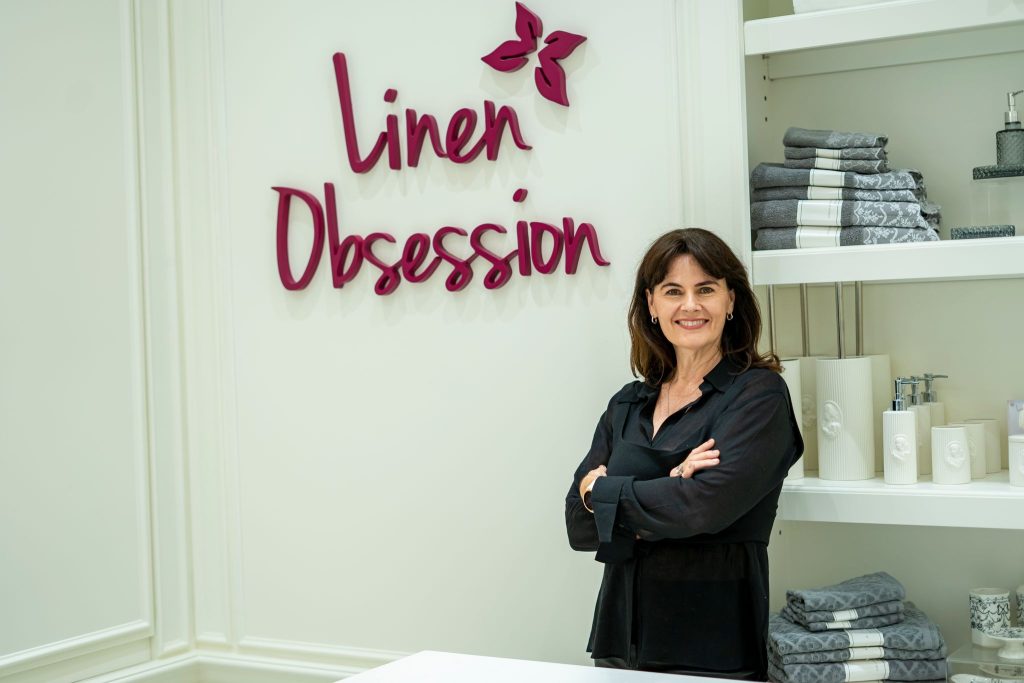
- What has been your journey in setting up Linen Obsession?
I came to Dubai 15 years ago specifically to start my entrepreneurial journey and to fill a gap in the market. I realised there was no professional, local supplier of European branded bed linen to the region. I had previously worked with companies supplying linen to local department stores across Australia, so I was familiar with all aspects of the retail bedding industry and it made sense to apply that knowledge and experience to a new market where opportunity was widespread. This was in 2008, six months later the financial crisis hit Dubai.
Fortunately, I had obtained the distribution rights for Esprit bedlinen in the Middle East during my previous employment. As a result, I was able to bring the Esprit Homewares distribution rights with me to Dubai for my new business venture. Soon after I was able to add another four Esprit licenced categories including; lighting, carpets, home decoration textiles and back to school ranges. This gave me a good start and resulted in my business being profitable from year one, despite the global economic crisis which hit that year.
The biggest challenge was funding the growth of Linen Obsession. Like many small businesses, being a trading company, we can only sell products which are available, and the purchase must be funded before the sale. Fortunately, I was able to negotiate a “sales agents” business model, meaning I did not need to buy initial stock myself, and instead earnt a flat sales commission on sales direct from overseas factories. The next step was to start local wholesale sales from our Dubai warehouse. Within five years, I could see the potential for bigger profits and market share by implementing a new business model: the “shop-inside-shops” concession model. In this structure, we took an allocated space within major department stores, where we placed our own stock and sales staff. This allowed me to maximise the sales of our best-selling brand, Christy England. We launched our ecommerce site called Linen Obsession in 2016. In the latest restructure, in 2018, we re-registered as a local company and took over our own warehousing which has given us the flexibility to further expand our high-end and very responsive customer service, as we are in control of our own logistics.
We now operate 35 concession stores across the GCC plus wholesale sales, ecommerce and our own retail, standalone store concept, called “Linen Obsession”. Linen Obsession is focused on our own selection of quality linen and natural wellness products from around the world, including some wonderful sleep solutions. Today we are the largest supplier of branded linen to department stores in the Gulf.
- What have been your biggest challenges as a woman in the field of retail?
Countries in the GCC were certainly not as forward thinking in 2008, as they are today. Luckily, with the UAE having been a trailblazer in women’s’ empowerment over the past decade; I can honestly say I feel that Dubai is one of the best places on earth to be a female entrepreneur. Now with Saudi Arabia hot on its heels, the region is seeing even more opportunities for women to start their entrepreneurial journey.
In 2018, female business founders only raised two percent of the total Venture Capital money invested over the entire year, globally, and female funding has been a constant concern. In my case, I had to self-fund the business for the first ten years, then in year eleven, I was fortunate to secure a loan from Beehive to cover a cashflow shortage to buy increased inventory. Crowd funding companies like Beehive really help to fill the funding gap for female entrepreneurs.
When I look back at what I’ve achieved, I appreciate how progressive I have been in building my business in stages and continually changing and evolving the business model. For any issue faced either as a woman or as an entrepreneur, I’ve always problem solved until I found the solution. The growth of my business has been at a steady pace and it’s been done in a risk-averse, customer-centric way. My company is strong, secure, and growing in a positive direction. I thank my team for their support in achieving this goal.
In the realm of retail and home textiles, it has been common for women to occupy senior positions for quite some time. Being an entrepreneur looking to supply countries like Saudi Arabia, my gender has in fact been an advantage. The Saudi retailers saw few female suppliers fifteen years ago, thus allowing easy arrangement of meetings, as we were a curiosity or rare sight back then.
- What advice would you give to someone looking to replicate your success as a business owner?
Having put ourselves in the fortunate position of managing the brand marketing, price level and distribution of the key linen brands we represent, we are able to retain control of what we do best. We recommend working exclusively with each individual brand, so you can take ownership of growth and not be at the mercy of anyone else’s actions.
It’s important to study your customer, in my case retailers, to identify gaps in their business and how you can add value to their product offer and service. When you’ve done that, you become a valuable supplier who can increase sales in a way that they can’t achieve by themselves.
The most important point is that your team is everything. It takes a long time to find the right people, and once you do find them; look after them well and make sure they’re happy. Rome wasn’t built in a day, nor was it built by one person.
- Tell us about Linen Obsession with some data points on why you felt the UAE was a smart hub
There was no question that Dubai was the right place to set up the company. The ease of setting up a business as a foreigner, the government support, transport and logistics links, all made it an obvious choice back in 2008.
There are more than fifteen thousand companies operating in the United Arab Emirates. New startups as well as small and medium-sized businesses (SMEs) make up 94 percent of the companies operating in the country, they contribute over 50 percent of GDP. This makes SMEs essential to the development of Dubai as a competitive, knowledge-based economy. The new laws implemented by the country’s leadership reflect this across everything from purchasing a company trade license, to golden visas, to corporate taxation laws and streamlined immigration services.
It helps that it’s a great place to live, and that suppliers and customers are very happy to visit us here. My business was very well supported by the Australian Government trade offices when I first moved to Dubai. Organisations such as AusTrade and the Victorian Government Trade Office greatly assisted me with the company set up options and even provided a desk space for me to work from, until I could finish the company formation and office fitout process.
The Dubai Government has set up a very open, positive and entrepreneurial city, which is very attractive to new startups like myself.












